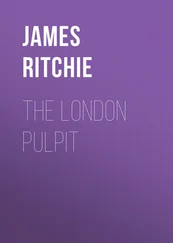James Ritchie - Here and There in London
Здесь есть возможность читать онлайн «James Ritchie - Here and There in London» — ознакомительный отрывок электронной книги совершенно бесплатно, а после прочтения отрывка купить полную версию. В некоторых случаях можно слушать аудио, скачать через торрент в формате fb2 и присутствует краткое содержание. Жанр: foreign_prose, Путешествия и география, на английском языке. Описание произведения, (предисловие) а так же отзывы посетителей доступны на портале библиотеки ЛибКат.
- Название:Here and There in London
- Автор:
- Жанр:
- Год:неизвестен
- ISBN:нет данных
- Рейтинг книги:4 / 5. Голосов: 1
-
Избранное:Добавить в избранное
- Отзывы:
-
Ваша оценка:
- 80
- 1
- 2
- 3
- 4
- 5
Here and There in London: краткое содержание, описание и аннотация
Предлагаем к чтению аннотацию, описание, краткое содержание или предисловие (зависит от того, что написал сам автор книги «Here and There in London»). Если вы не нашли необходимую информацию о книге — напишите в комментариях, мы постараемся отыскать её.
Here and There in London — читать онлайн ознакомительный отрывок
Ниже представлен текст книги, разбитый по страницам. Система сохранения места последней прочитанной страницы, позволяет с удобством читать онлайн бесплатно книгу «Here and There in London», без необходимости каждый раз заново искать на чём Вы остановились. Поставьте закладку, и сможете в любой момент перейти на страницу, на которой закончили чтение.
Интервал:
Закладка:
We will suppose that for this time only the doorkeeper has relaxed his usual vigilance, and you have managed to effect an entrance. There is as much difficulty in getting a stranger into the Reporters’ Gallery as in getting Baron Rothschild into the House. As the gallery will not hold more than thirty, it is quite right this should be the case. On the back seats the reporters are sitting idle – some criticising the speakers in a manner anything but complimentary – some sleeping – some reading a quarterly; but on the front seat you see some dozen or thirteen, each in a little box to himself, busily engaged. If the speaker be a great gun, the reporter puts forward his utmost energies and takes down every word – if he be one of the illustrious obscure the task is less difficult, and a patient public is saved the painful duty of reading the ipsissima verba of Smith or Brown. Beside the reporter, in some cases, sits another gentleman, who has, comparatively speaking, an easier office to perform. He is the gentleman that does the parliamentary summary to which you instinctively turn, instead of wading through the eight or nine columns that give the debate itself. I believe the summary writer in the gallery remains all night, while the reporters take their turns, which last on an average half an hour. Thus, no sooner has a reporter been at his post for that time, than he leaves the house and rushes up to the office to copy out his notes; this may take him an hour. He then returns, and is ready to go on again when he is due. It would be utterly impossible for one man to report a debate and then to copy out his notes, and be in time for the paper of the next morning; consequently each paper is compelled to have a body of nine or ten parliamentary reporters, and these reporters, in order that they may all have an equal chance, vary their turns every week. Thus the man who goes on one week at four, goes the next at a later hour – and the reporter who is one week in the Commons, perhaps the next has the honour of sitting in the House of Lords. Otherwise the hard work might fall to a few, and the rest might take it very easy indeed.
As we don’t happen to be reporting, we will look about us a little. We will report reporters as they are: on our left, just below us, is the reporter for the Star ; next comes the Daily Telegraph , then the Advertiser , and then the Daily News . Three boxes are occupied by the Times : one for the reporters, one for the summary writer, and one for the manager of the Times parliamentary staff. On the other side are the Chronicle reporter and summary writer, the Herald ditto, and the Post . Up to six o’clock in the evening the Globe , and the Sun , and the Express have each a parliamentary reporter present. The gallery is under the care of Lord Charles Russell, Sergeant-at-Arms, who is sadly put to it where to stow the gentlemen of the press, who have increased far beyond the limits of the gallery. Behind the gallery are rooms in which some reporters write out their notes; and so hot and inconvenient are they, that his lordship has latterly acceded to the reporters a committee room attached for such as need it. Behind the gallery also is a refreshment room, and a policeman to keep out intruders. A few of the weekly papers have reporters in on Thursday and Friday nights, and these constitute the only habitués of the gallery. Of course the aspect of the house is different to what it is when viewed from the Strangers’ Gallery. You miss the Speaker and his ornamental chair and majestic wig, but you have a better view of the gangway and the bar – you see the Sergeant-at-Arms, wearing a sword, seated on his easy chair – that chair being made easy by the receipt of twelve hundred a year. You see the gallery under the Strangers’ Gallery in which peers, and members’ sons, and old M.P.’s occasionally sit; and now and then, through the glass door by which members enter, you see a bonnet, a bit of muslin – the lustre of some female eye – denoting that woman in her loveliness is taking note of the Conscript Fathers. This reminds us that the Reporters’ Gallery is just under the little cage in which the British fair are confined during a debate. The consequence is to some of the reporters who wear moustaches, and cultivate the art of killing – who get themselves up in a very different style to your fathers of families – a Barmecide feast of the most cruel kind. They hear the murmur of female voices, not always “gentle and low” – they know that, shining like stars above them, are forms such as “might melt the saintship of an anchorite;” that above them are eyes more eloquent than the tongues below, but they cannot realise what they can imagine; and whilst music comes to them —
“Like ocean which upon the moonlight shores
Of lone Sigæum steals with murmuring noise,”
they must take down the common sense of common men; such is their cruel fate. And now one word about our companions. Most of them are young men – some are in their prime. None of them are old; old reporters are only met with where dead donkeys and departed postboys are common. At any rate they are not engaged on the morning papers: the late hours, the hard stretch of mind required in a reporter, don’t exactly suit old men. If you think reporting easy, my good sir, you are most egregiously mistaken. It takes you two or three years to master shorthand sufficiently to assume your place as a reporter in the gallery. When you have done that, you will find that you don’t get your money for nothing, I can assure you. You must for half an hour take down all you can hear; you must then copy that out into long-hand and plain English as best you can. You must then come back into the house and take another turn, and so on, till the house is up; and then, worn and weary, you must again trudge to the office, and there indite the copy which, before the ink with which it is written is dry, is in the composing-room and in type. As this may detain you till four o’clock in the morning, you are then at liberty to retire to your bed, if it suit you, or to the flowers and early purl of Covent Garden, if it be summer time, and you are of a sentimental turn. Now, occasionally, it is all very well to sit up till three or four o’clock in the morning; London then is invested with a grandeur and stillness very impressive: the air is fresh and pure, bearing with it the odours of the country; the grand Cathedral of St. Paul looms proudly before you; the streets seem broader, longer than usual; and, far off, we catch glimpses of Hampstead or of the Surrey hills; but when you have to see this, not once, but every morning, the case is altered, the spell is broken, and the charm is gone; and such a life must tell, sooner or later, upon the constitution. Reporters are not rosy, jolly men; they don’t look like Barry Cornwall’s happy squires,
“With brains made clear
By the irresistible strength of beer.”
Most of them live well, and are protected against the inclemencies of the weather. The reporters of the Daily News and Times come down in cabs, but they appear delicate hothouse plants; though, after all, they do not look worse than a popular M.P., such as Lord Dudley Stuart or Mr. Milner Gibson, at the end of a session. As a class, we have already hinted, the reporters are intellectual men; among them are many who have embraced literature as the noblest of all professions, and have as sacredly devoted themselves to it as, in old times, priests did to the service of their gods. You can tell these by their youthful flush and lofty foreheads. A time may come when the world may seduce them from the service, when all generous aspirations may fade away, when crushing selfishness shall make them common as other men. Then there are others to whom reporting is a mere mechanical calling, and nothing else; who do their week’s work and take their week’s wages, and are satisfied; but most of the parliamentary reporters are clever men, and all aspire to that character. The mistake is one a little self-love will easily induce a man to make. Men of infinite wit and spirit have been in the gallery; therefore, the men in the gallery now are men of infinite wit and spirit. A gorgeous superiority over other men is thus tacitly assumed. You will hear of such a one, that he was a reporter on the Times , but he was not clever enough for that, and so they made him an M.P. But, after all, no man of great genius will report long if he can help it: reporting is a terrible drudgery. A man who can write his thoughts well will not willingly spend his time in copying out the thoughts of others. Dickens was a reporter for the Morning Chronicle , but he, though his talent in that way was great, though he could perform almost unparalleled feats as a reporter, soon left the gallery. At one time Angus Reach was in the gallery; there, till recently, might have been seen that accomplished critic and delightful novelist Shirley Brooks. For a literary man reporting is a capital crutch: he is well paid, and it often leads to something else. The Times ’ reporters are divided into three classes, none of whom get less than seven guineas a week. The other papers do not pay quite so well; but a literary man, if he be in earnest, can live on less than that till the day comes when the world owns him and he becomes great; and if his dream of fancied greatness be but a dream – if hope never realise the flattering tale she at one time told, still he has a means of respectable livelihood, and may rise from a reporter into an editor. Mr. James Grant, editor of the Morning Advertiser , was at one time reporter for that paper. In some cases the ambition of the reporter does not end quite so successfully. Only recently a reporter for one of the morning papers contested an Irish borough. Unfortunately, instead of being returned, the ambitious youth was thrown into gaol for an insignificant tavern bill of merely £250 for eleven days. What cruelty! What talent, what hope, what failure, have there not been in the Reporters’ Gallery! And those who know it, if they wanted, could find abundance of material there with which
Читать дальшеИнтервал:
Закладка:
Похожие книги на «Here and There in London»
Представляем Вашему вниманию похожие книги на «Here and There in London» списком для выбора. Мы отобрали схожую по названию и смыслу литературу в надежде предоставить читателям больше вариантов отыскать новые, интересные, ещё непрочитанные произведения.
Обсуждение, отзывы о книге «Here and There in London» и просто собственные мнения читателей. Оставьте ваши комментарии, напишите, что Вы думаете о произведении, его смысле или главных героях. Укажите что конкретно понравилось, а что нет, и почему Вы так считаете.












